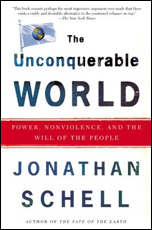In the opening pages of this formidable work, Jonathan Schell (The Fate of The Earth) identifies a lesson for the twenty-first century in the terrible violence that plagued the world during the twentieth century: "It is that in a steadily and irreversibly widening sphere, violence always a mark of human failure and a bringer of sorrow, has now also become dysfunctional as a political instrument. Increasingly, it destroys the ends for which it is employed, killing the user as well as his victim. It has become the path to hell on earth and the end of the earth.” And yet, as we look around today, there is ample evidence that the lust for blood-letting has not abated.
In 2001, according to the Stockholm International Peace Research Institute, 24 wars were in progress, of which 21 were mainly within nations. These included turf battles among local warlords, civil wars, class wars, religious wars, ethnic wars, and combinations of the above. In addition, the United States has adopted a strongly interventionist stance in the name of a “new world order.” Schell laments the Bush Administration's sharp swerve away from international treaties and other forms of cooperation. Bush's National Security Strategy carries the rule of force to an extreme: “A policy of unchallengeable military domination over the earth, accompanied by a unilateral right to overthrow other governments by military force, is an imperial, an Augustan policy.”
Although Schell does not consider himself a pacifist, he does have great respect for the nonviolent actions that fueled Gandhi’s satyagraha ("truth or soul force") in India and the social movements that helped bring about the downfall of the Soviet Union in the last century. He presents a substantive overview of the revolutions in America, France, and Russia, and the people’s war in China and Vietnam. He also celebrates the civil rights campaign of Dr. Martin Luther King, Jr. as a triumph of nonviolence. Unfortunately, we have not built on these successful forces for good and created policies aimed at cooperation and mutual benefit.
Schell asks: “Can cruise missiles build nations? Does power still flow from the barrel of a gun — or from a Predator Drone? Can the world in the twenty-first century really be ruled from thirty-five thousand feet? Modern peoples have the will to resist and the means to do so. Imperialism without politics is a naïve imperialism. In our time, force can win a battle or two, but politics is destiny.” With poise and precision the author calls for a revolution against violence based on disarmament, democratization, human rights, international law, and local and regional peacemaking. He concludes: “Peace, social justice, and defense of the environment are a cooperative triad to pit against the coercive, imperial triad of war, economic exploitation, and environmental degradation.”
The Unconquerable World is required reading for all those who believe in the power of nonviolence to bring a more peaceful globe.
